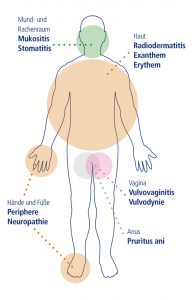The role of endogenous cannabinoids in skin and mucosal inflammations
Damage to the skin and mucous membranes is one of the most common side effects related to cancer therapy. It affects not only a patient’s quality of life, but also the success of treatment. The aim of cancer treatments is to slow or even stop the growth of a tumour. The ability of cells to divide is thereby suppressed. This is particularly bad not only for tumour cells, but also for healthy cells. The cells affected most are those in the skin and mucous membranes.

Side effects of cancer treatment
If tissue is irritated due to treatment, an inflammatory reaction occurs in the skin and/or mucous membrane which is aggravated by therapy. Inflammation is a basic, protective reaction designed to remove the harmful stimuli and initiate the healing process. A chronic inflammation, however, exceeds the limits of physiological control and thus causes harm. Some of the immediate consequences are dryness, redness, swelling, burning, pain and abnormal sensations.
Chronic inflammatory processes that cause lasting pain in fact trigger the production of lipids which can stop the inflammation. ALIAmides (autacoid local injury antagonism amides), which are composed of fatty acids and ethanolamines, make up an interesting group of such natural mediators. These ALIAmides also include the endocannabinoids anandamide and palmitoylethanolamide (PEA). [1]
| The production of PEA is increased by stress | Effect of PEA |
| Through inflammation in peripheral tissue | Anti-inflammatory |
| Through inflammation in nerve tissue | Neuroprotective |
| Through pain reaction | Analgesic |
The statements above suggest that PEA maintains cellular balance as inflammatory processes emerge. The logical consequence is that pathological conditions can develop in which the endogenous PEA level does not suffice to limit the resulting damage. In such cases, the external application of PEA is a realistic therapeutic means of supplementing the body’s own reserves.
With their combined anti-inflammatory and analgesic properties, cannabinoids are especially suitable as a medicinal method of skin care during cancer treatments. Use of the synthetic cannabinoid adelmidrol has a long track record. Medicinal skin care products containing endogenous cannabinoids (PEA) are now also available.
The function of endogenous PEA, as an element of the complex immunological regulation system, is therefore to regulate and limit inflammation. It thus plays a key role in maintaining the cellular balance of inflammations.
The cannabinoid-based AgainLife products from Bendalis GmbH (including EvaLife cream, RaLife cream, OraLife mouthwash) offer relief for damaged skin and mucous membranes under cancer therapy. The entire range of products is free of cortisone and available without prescription from pharmacies. For more information, go to www.againlife.de.
Sources
[1] Stephen D. Skaper, Laura Facci and Pietro Giusti, Immunology 2014, doi:10.1111/imm.12170
